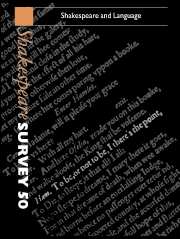Book contents
- Frontmatter
- Shakespeare’s Language and the Language of Shakespeare’s Time
- ‘I’ll plague thee for that word’: Language, Performance, and Communicable Disease
- The Language of the Spectator
- Marlowe’s Edward II: Penetrating Language in Shakespeare’s Richard II
- Hamlet’s Ear
- Secrecy and Gossip in Twelfth Night
- Shakespeare Rewriting Ovid: Olivia’s Interview with Viola and the Narcissus Myth
- ‘Voice Potential’: Language and Symbolic Capital in Othello
- Household Words: Macbeth and the Failure of Spectacle
- Erring and Straying Like Lost Sheep: The Winter’s Tale and The Comedy of Errors
- The ‘Shakespearian Gap’ in French
- Reading the Early Modern Text
- Shakespeare and the Metamorphosis of the Pentameter
- Rereading Illustrations of the English Stage
- Nietzsche’s Hamlet
- ‘Strange and woonderfull syghts’: The Tempest and the Discourses of Monstrosity
- Shakespeare Performances in England, 1996
- Professional Shakespeare Productions in the British Isles, January–December 1995
- 1 Critical Studies
- 2 Shakespeare’s Life, Times, and Stage
- 3 Editions and Textual Studies
- Books Received
- Index
Shakespeare Rewriting Ovid: Olivia’s Interview with Viola and the Narcissus Myth
Published online by Cambridge University Press: 28 March 2007
- Frontmatter
- Shakespeare’s Language and the Language of Shakespeare’s Time
- ‘I’ll plague thee for that word’: Language, Performance, and Communicable Disease
- The Language of the Spectator
- Marlowe’s Edward II: Penetrating Language in Shakespeare’s Richard II
- Hamlet’s Ear
- Secrecy and Gossip in Twelfth Night
- Shakespeare Rewriting Ovid: Olivia’s Interview with Viola and the Narcissus Myth
- ‘Voice Potential’: Language and Symbolic Capital in Othello
- Household Words: Macbeth and the Failure of Spectacle
- Erring and Straying Like Lost Sheep: The Winter’s Tale and The Comedy of Errors
- The ‘Shakespearian Gap’ in French
- Reading the Early Modern Text
- Shakespeare and the Metamorphosis of the Pentameter
- Rereading Illustrations of the English Stage
- Nietzsche’s Hamlet
- ‘Strange and woonderfull syghts’: The Tempest and the Discourses of Monstrosity
- Shakespeare Performances in England, 1996
- Professional Shakespeare Productions in the British Isles, January–December 1995
- 1 Critical Studies
- 2 Shakespeare’s Life, Times, and Stage
- 3 Editions and Textual Studies
- Books Received
- Index
Summary
The writer is always a rewriter, the problem then being to differentiate and authenticate the rewriting. This is executed not by the addition of something wholly new, but by the dismembering and reconstruction of what has already been written.
(Terence Cave on creative imitation of the classics in the sixteenth century)When Orsino sends her to Olivia with his latest message of love, Viola sees little hope of success for,
If she be so abandoned to her sorrow
As it is spoke, she never will admit me.
(1.4.19-20)Still grief stricken after nearly a year, the young Countess has only recently announced her intention to continue in mournful seclusion for a further seven years; and it is public knowledge that she has also solemnly forsworn any romantic attachment. And yet it takes only a brief display of obstinacy before Viola is admitted, Olivia explaining that hearing of her spirited responses to Malvolio, she has 'allowed your approach rather to wonder at you than to hear you' (1.5.189-91). She has no interest in the message, then, but the messenger is being entertained because 'he' promises to be a diverting curiosity. Yet if Olivia were still 'so abandoned to her sorrow / As it is spoke', the interview would not take place at all. And even if one ignores the incongruity of a 'fair young man' being admitted to the presence of one who has 'abjured the sight / And company of men' (1.2.36-7), here is a young woman, having just publicly announced that she is shutting herself away from the world to spend the foreseeable future weeping and mourning, ready to avail herself of casual diversion.
- Type
- Chapter
- Information
- Shakespeare Survey , pp. 81 - 90Publisher: Cambridge University PressPrint publication year: 1997



